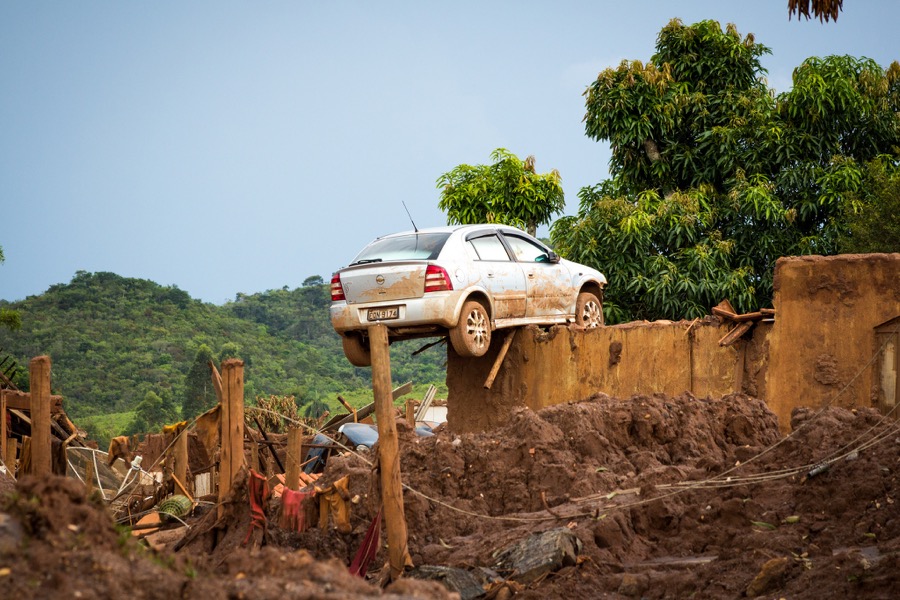Miners creep through legal minefield as Brazilian scales tip

The future of some of the world’s biggest mining operations remains mired in uncertainty after a fatal dam spill helped transform Brazil’s relatively light corporate scrutiny into a legal minefield.
The 2015 disaster at the Samarco iron-ore mine, which left 19 dead, precipitated a cascade of legal issues and challenges for the still-shut venture owned by Vale SA and BHP Billiton Ltd. Mining’s reputation in Brazil was further tarnished this year when an alleged waste-water leak at the world’s largest alumina refinery, owned by Oslo-based Norsk Hydro ASA, led to a court-ordered 50 percent production curtailment.
The Samarco accident, considered Brazil’s worst environmental disaster, has made prosecutors and judges more critical of companies, say lawyers including Clovis Torres. The former Vale executive, who played a key role in the legal proceedings when the Samarco partners launched cleanup and compensation efforts, says officials are looking at mining and metal operations much more closely in Brazil even though the laws haven’t changed.
The Samarco accident, considered Brazil’s worst environmental disaster, has made prosecutors and judges more critical of mining companies.
“Mining has a bad image at the moment,” Torres said by telephone from Sao Paulo. “I would prefer to believe judges won’t rule based on current social circumstance, or media frenzy and pressure, and instead by the rule of law.”
Despite billions spent on restitution and pressure from thousands of unemployed workers, Samarco remains idled. The best-case scenario is a limited restart at the beginning of 2019, according to Rio de Janeiro-based Vale, while Wood Mackenzie analysts predict 2020.
‘Aligned on Facts’
Vale, the world’s largest iron-ore producer, has said the venture won’t prepare to restart until a deal can be made with prosecutors. BHP declined to comment.
“Samarco is working to resume operations responsibly, with absolute security and the support of the community,” the joint venture said last week in an email.
The history of Norsk Hydro’s alumina refinery, known as Alunorte, provides a glimpse into how Brazil’s legal landscape has shifted since Samarco. Heavy rains led to a previous spill at Alunorte in 2009. But after that incident, the company was not forced to halt production, nor did it pay all its fines, according to Brazil’s national environmental watchdog Ibama.
Norsk Hydro is still discussing the remaining 2009 fines with authorities, Halvor Molland, a company spokesman, said by email. As for discussions to end the current suspension, he said the talks have improved as both sides “seem to be more aligned on facts.”
‘Society Now Demands’
The prosecutors’ task force at the forefront of the Alunorte case declined to comment, as did Federal and state prosecutors involved in the Samarco case.
The new realities for mining companies are part of a broader shift sweeping through Brazil’s judicial system.
One of Alunorte’s most vocal critics says miners shouldn’t be surprised by the new scrutiny they are facing because the “trauma” of Samarco triggered anxiety in Brazil and put more pressure on the judiciary.
“Authorities are more focused on environmental concerns because society now demands it,” Ismael Moraes, a lawyer for the advocacy group Cainquiama, said by phone. Cainquiama alleges Alunorte has polluted the environment.
The new realities for mining companies are part of a broader shift sweeping through Brazil’s judicial system, said Leonam Gondim da Cruz Jr., the Para state judge currently evaluating one of the injunctions keeping Alunorte at partial production. Brazilians have expressed a greater desire to put an end to apathy since the “Operation Carwash” corruption probe ensnared some of the country’s powerful elite.
‘The Impunity’
Public outrage has fueled a “war against the impunity that has always dominated Brazil,” Gondim said by phone from Belem. Brazilians now react quicker and more ferociously to legal infractions instead of “letting them fall by the wayside for eternity like it’s always been.”
On Tuesday, Gondim rejected Norsk Hydro’s petition that the court not consider information provided by Cainquiama when making its ruling on whether to lift the injunction keeping Alunorte from resuming full production. Cainquiama represents several local families who claim water supplies have been contaminated by Alunorte.
Recent reactions by London-based Anglo American Plc indicate global miners are adapting to the new realities in Brazil. After its iron-ore operations in the country, Minas-Rio, suffered two pipeline leaks within a few weeks in March, the miner made a tough decision.
While no one was severely injured in either accident, and the environmental impact was minimal, Anglo announced a full shutdown and inspection, rather than attempting a quick fix. Production is unlikely to restart until the end of the year and the delay and reparations may cost the company as much as $400 million in lost earnings, the London-based miner said in April.
Despite the added costs, Anglo executives shifted from suspending operations for 90 days to a longer timeframe to ensure it could “guarantee” a safe restart, the company’s press department said by email.
{{ commodity.name }}
{{ post.title }}
{{ post.date }}




Comments